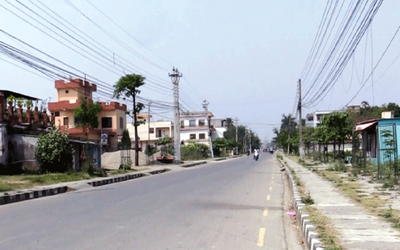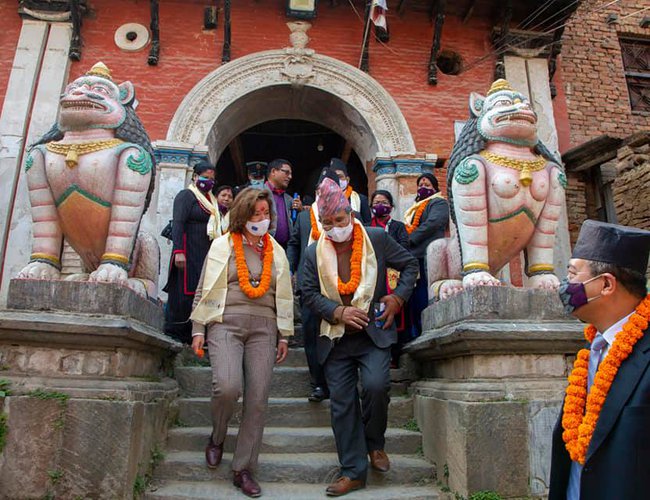
In their traditional attire, and with music, local people of Bugmati, a traditional Newari settlement, were enthusiastically waiting for their guests, Ambassador of European Union to Nepal Nona Deprez and Mayor of Lalitpur Chiri Babu Maharjan on February 26. For the local residents of Khokana and Bungmati, it was a day of celebration.
They welcomed Ambassador Nona Deprez and Mayor Maharjan in their traditional elegance as the guests jointly laid the foundation stone of the Multipurpose Training Center in Bugmati amid a function.
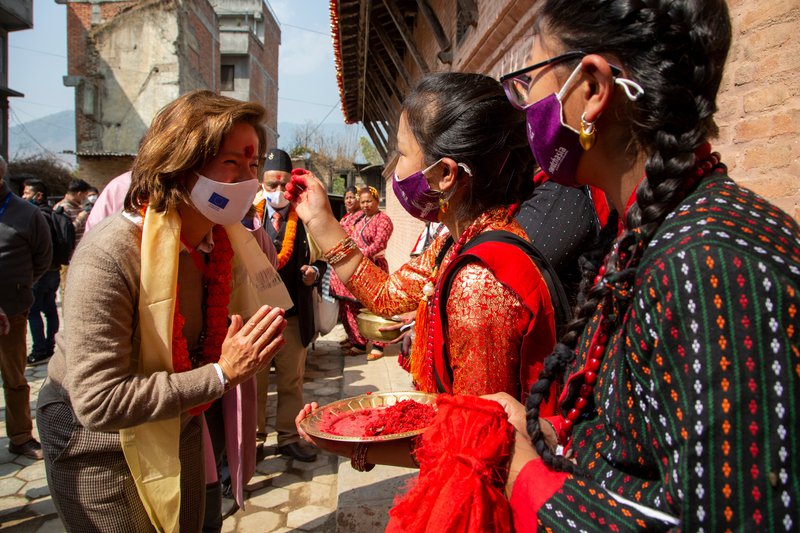
Damaged and devastated by the Gurkha earthquake in 2015, the Newari settlements have been revived, preserving their past glory. Supported by the European Union and implemented by UN Habitat through Sustainable Tourism and Green Growth collaboration with local community, NGOs, Lalitpur Metropolitan and NRA, Sustainable Tourism and Green Growth for Heritage Settlements of Kathmandu Valley is a game changer for the local community.
The earthquake damaged 563 of 856 houses in the core area of Bungamati. Most of the buildings that survived were also badly damaged and were left unusable. Major temples and shrines were lost including Machhendranath, Hyagriv Bhairav and Manakamana temple. The biggest loss was the private houses with heritage values. In the last six years, almost everything has been revived.
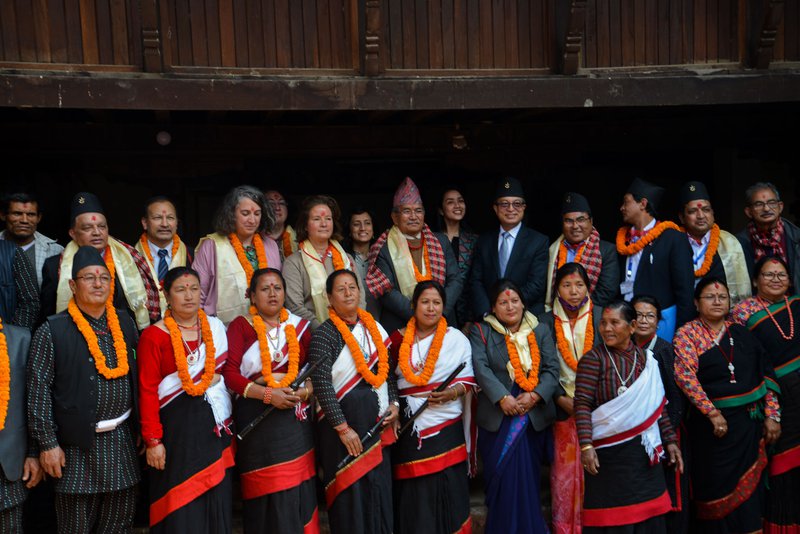
At a time when many other traditional settlements are still in the process of revival, local community of Khokana and Bungmati have already seen the results yielded. Although COVID-19 has badly shaken Nepal’s tourism sector due to lack of foreign tourists, Khokana and Bungamati are attracting the domestic tourists.
For the support given by European Union to revive and preserve their city and way of life, ambassador Nona Deprez’s presence was highly important for them. The warm welcome given to the ambassador was their reflection of love for the revival of their city.
During the last four years, Bungamati and Khokana have been drastically transformed from being the cities of devastation and destructions to the cities of revived with their traditional settlement. Along with private house, Falacha Pati, stone spout, traditional well, traditional ponds, street solar lights, renovation of public toilets and view point have already been constructed.
A total of 320 locals have been trained on various skills like Yomari Moulding, Wood Craft, Homestay Management, Cooking and Food Processing, Dhime Instrument, Lakhe Dance, Pickle production, Bhyo, Advance stitching etc. Other 228 locals, including 182 females, were trained in Entrepreneurship Development.
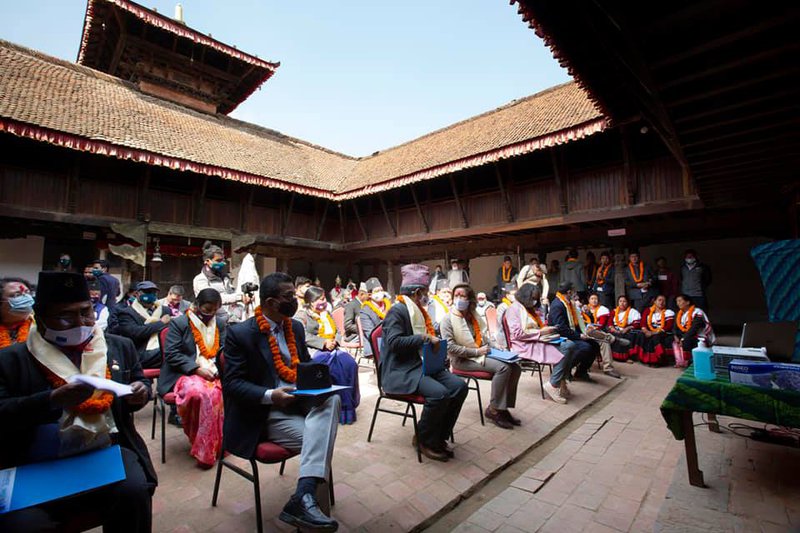
Realizing the importance of a formal institution to train the local youth, the project has designed a training center. This is going to be a major part to train youths in traditional skills. This is important for sustainable tourism promotion and employment generation.
European Ambassador to Nepal Nona Deprez and Mayor of Lalitpur Metropolitan City Mahajan jointly laid the foundation stone of the Multipurpose Training Center in Bugmati amid the function on February 28.
The center will be used to train people in traditional crafts of the areas. The center will also provide training to the young people traditional skill under the Build Back Better. This kind of training will be exemplary for local youth to learn traditional craftsmanship.
The objective was Promoting Sustainable Consumption and Production (SCP) with heritage tourism sector stakeholders, including the policy makers of reconstruction, through demonstration in the Bungamati settlement, policy advice, dialogue and advocacy at Kathmandu Valley / Nepal level;
“Training young people in traditional crafts like woodcarving is a great example of the economic opportunities of promoting culture,” said ambassador Deprez who interacted with local community observing their way of life.
Ambassador Deprez thanked the local community, UN-Habitat Nepal for the preservation of traditional crafts. She also thanked the Mayor of Lalitpur for their exemplary cooperation to restore the ancient cultural city of Bungamati.
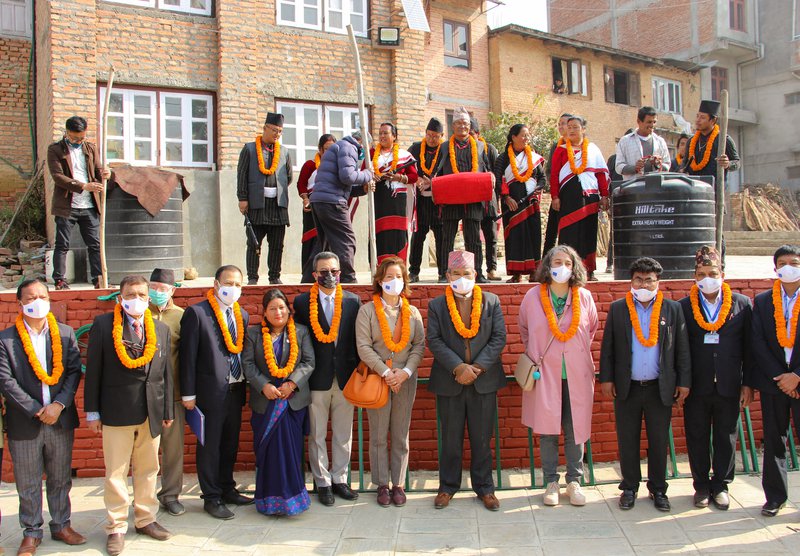
Mayor of Lalitpur Metropolitan City Maharjan lauded the support given by European Union for the revival of the two traditional Newari settlements and livelihood. “LMC and local community are very grateful to European Union for its support and UN Habitat and other NGOs for their contribution to restore the cities in the old style.”
The partners of the project are Nepal Government, Switch Asia, European Union, Lalitpur Metropolitan City Ward 22 and Bungamati Area Reconstruction and Development Council (BARDeC).
Implementation partners include UN-Habitat for Overall implementation, Centre for Integrated Urban Development (CIUD) Heritage conservation, LUMANTI Community mobilization, SAARC Business Association of Home-based Workers- SABAH-Nepal for Livelihood and tourism promotion and Institute of Housing and Urban Development Studies (IHS) for capacity building.
In close collaboration with local elected representatives, local communities and Nepal government, the project has been reviving not only the physical restructuring but also the traditional life styles, cultures and handicrafts. Thus, the multi-purpose training center is highly important.
Driving a few kilometers from congested and crowded new urban settlements of Patan and Kathmandu, one can find well preserved traditional Newari settlements in Bungmati and Khokana. This is also an example to show how different organizations can work together to Promote Sustainable Tourism and Green Growth in Heritage Settlements of Kathmandu Valley, contributing to the overall SWITCH Asia objectives of promoting sustainable development, reducing poverty and contributing towards mitigating climate change. European Union has been financially supporting the project.
The project is promoting entrepreneurship among women and youth. With SME engagement and investment, product innovation and sector campaigns, the project hopes to support the livelihood of the people.
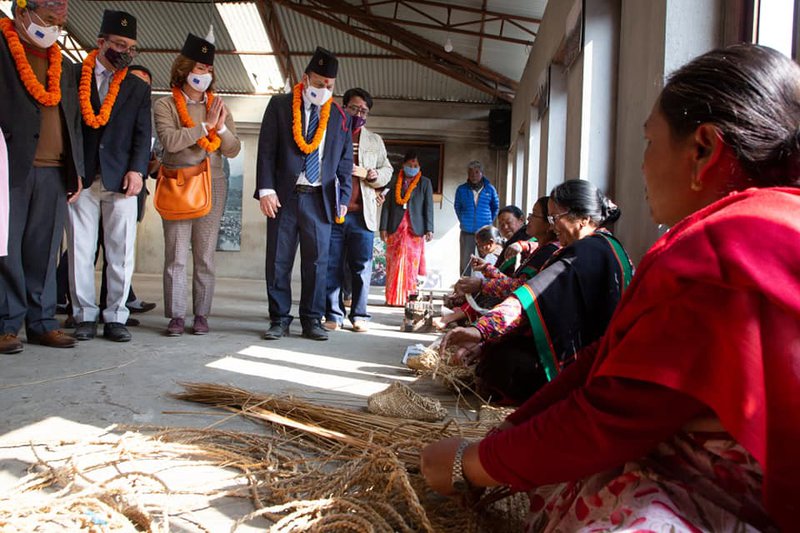
Sharing the Success
After learning from Bungamti, Heritage Recovery Plan handed over to respective Municipalities, including Kisipidi, Balambu, Kirtipur, Panga, Chovar, Siddhipur, Lubhu, Thecho, Chapagaon and Thaiba.
Although some of traditional Newar settlements in the Kathmandu Valley have been losing their traditional styles with rampant construction of new concrete structures, Khokana and Bungamti have preserved their traditional style as a showcase for other settlements.
Had the UN-Habitat not sought solutions through sustainable tourism, Bungmati would also not have revived as it is today. UN-Habitat launched the project with the main objective of reducing poverty through building the economy of people contributing towards mitigating climate change, promoting sustainable development through technical assistance policy support and pilot demonstration.
Community mobilization, heritage conservation and livelihood enhancement are three pillars of the project. These are key factors for revival of Bungmati as well. During the visit of ambassador Deprez, local people have shown how their tradition and culture can lure tourists in the future thanks to the support of European Union.
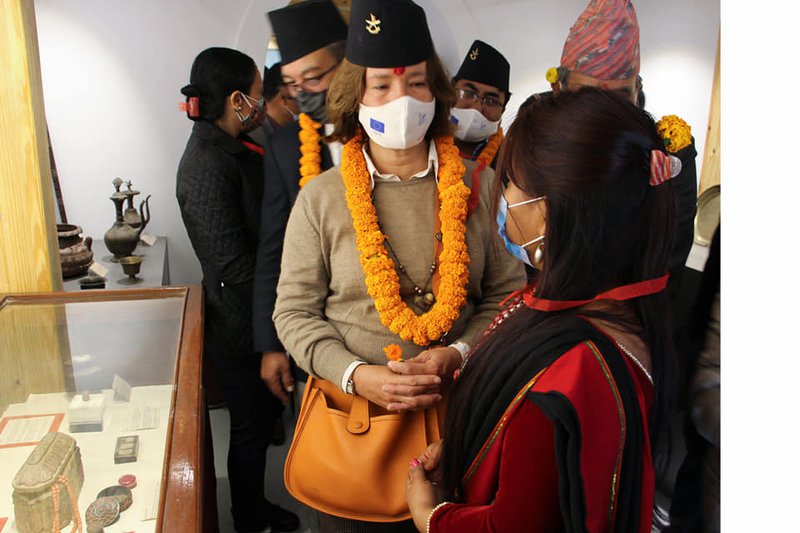
- TANAHU HYDROPOWER PROEJCT: A Significant Achievement
- Apr 15, 2024
- AMBASSADOR HANAN GODAR: Sharing Pain With A Nepali Family
- Mar 30, 2024
- VISIT OF KfW AND EIB TO NEPAL : Mission Matters
- Mar 25, 2024
- NEPAL BRITAIN SOCIETY: Pratima Pande's Leadership
- Mar 24, 2024
- NEPAL ARMY DAY: Time To Recall Glory
- Mar 15, 2024










